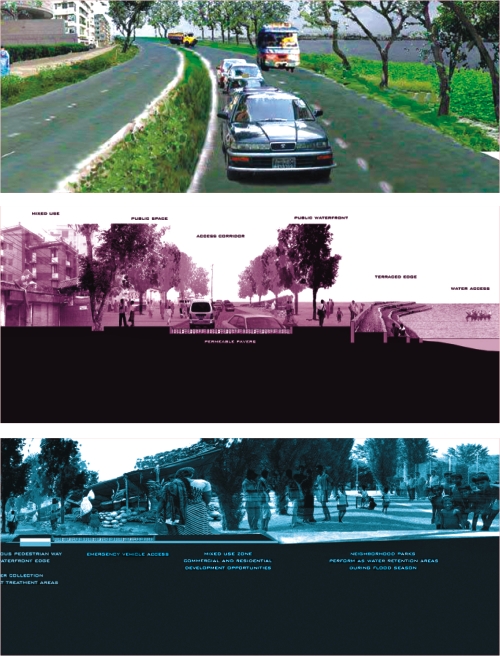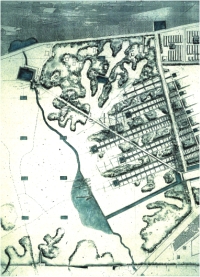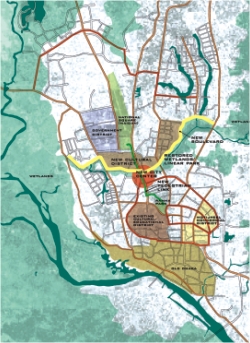 |
|
 |
|
 |
|
 |
|
Wetlands in urban context
Workshop on the wetlands 2005
In June of 2005, the Urban Water, Wastelands, Society and Design Alliance (now the Institute for Sustainable Urban Societies/ISUS)*, an international group of architects, landscape architects, urban designers, planners, scientists and engineers with headquarters in Boston and Dhaka, together with the Centre for Excellence and Professional Development of Presidency University and Interface Bangla Ltd, organized the symposium and workshop “Sustainable Solutions for Urban Water and Wastelands,” which focused on the ongoing loss of open space and wetlands in Dhaka and the potential for a restored wetland network to play a significant role in managing annual flooding, treating urban wastewater, improving air quality, creating additional jobs and better living situations for the poor, offering alternative modes of transportation, and providing recreational amenities for all urban residents.
The seven-day event, held at Presidency University took as its
Anuradha Mathur, Associate Professor, School of Design,
University of PennsylvaniaPlan for a project between the high stable ground of the city and low shifting ground of the floodplain of the Buriganga. Fingers of experimental agricultural fields, parkland, and reservoirs provide the framework for this new public park at the northern edge of Sher-e-Banglanagar. This land is presently filled and completely developed without any accommodation for the Buriganga in high and low water.
main objective the bringing together of concerned professionals from various organizations and academic institutions for a shared conversation about the current state of Dhaka's ecological infrastructure and sustainable approaches to future development.
Speakers included among others: Dr. Dhrubajyoti Ghosh of Kolkata, an expert on the role of wetlands in treating urban wastewater; Dr Ainun Nishat of the World Conservation Union (IUCN); Dr. Atiq Rahman of the Bangladesh Centre for Advanced Studies; Attorney Rizwana Hasan of BELA; Dr. Nazrul Islam and Salma Shafi of the Centre for Urban Studies; Dr. Mizan R. Khan, Chair of the Department of Environmental Studies at North-South University; Assistant Professor Ishrat Islam of the Department of Urban & Regional Planning at BUET; Dr. M. Ashraf Ali of the Department of Civil Engineering at BUET; Md. Sirajul Islam, Chief Town Planner and Architect at Dhaka City Corporation, and architect Tanya Karim, organizer of the Dhaka conference and workshop.
The target area of the workshop was the Hatirjheel and Begunbari Khal, the last semi-intact wetland of note within the city proper; while the aim was to develop integrated strategies for water management and urban land-use aimed at alleviating social, environmental, economic and public health
Proposed plan issues associated with flooding, continuing population growth and widespread poverty. Central to the discussion was the use of water as urban infrastructure, where hydrological issues would serve as starting point and framework for future urban planning and design efforts. The workshop's final recommendations, presented to Water Resources Minister Hafiz Uddin Ahmed at the closing ceremonies, included building an east-west boulevard, linear park system and new city center along the Pantha Path which would be integrated with a more expansive and better functioning water containment and transfer system that gives more land to flood water detention; manages siltation; aids in metropolitan wastewater treatment strategies; preserves excess water for the dry season; provides livelihood opportunities and a residential zone with decent housing and legal land tenure for the urban poor; and offers recreational land and an overall improvement in the quality of urban life to all of Dhaka's inhabitants.
The follow-up 2006 conference and workshop organized by ISUS (formerly Urban Water, Wastelands, Society and Design Alliance) Urban Waters/Alternative Futures, will explore the impact of global climate change on coastal and deltaic urban areas and landscapes while focusing on Dhaka and New Orleans, Louisiana. The conference will be held in June at the Watson Institute for International Studies at Brown University in the USA.
[*ISUS is an international not-for-profit research and design alliance formed for the purpose of developing innovative, integrated and implementable solutions to the complex environmental, hydrological, social and economic issues facing many cities today in both developing and post-industrial nations. The information and images for this section was provided by Elizabeth Dean Hermann, Professor of Urban Design, Landscape Architecture, and Islamic Architectural History at the Rhode Island School of Design in the USA. She is also the co-founder, along with Tanya Karim, of ISUS.]


